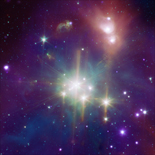
Coronet Star Cluster (NASA/CXC/JPL-Caltech/CfA)
Astronomy 307 - Spring 2010
INTRODUCTORY ASTRONOMY
TTh 11:00-12:30 · RLM 15.216B · Unique No. 49020
Professor
RLM 16.324 · (512) 471-3449 · email
Courses - Spring '10 | Course Website
|
Section/Semester: |
Unique No. 49020, Spring 2010 |
|
Class Meetings: |
Tues & Thurs 11:00-12:15 AM, RLM 15.216B |
|
Instructor: |
Prof. Harriet Dinerstein |
|
Contact Info: |
(512) 471-3449, harriet@astro.as.utexas.edu |
|
Office Hours: |
RLM 16.324, M 1:30-2:30, W 10:30-11:30, or by appt |
|
Teaching Assistant: |
Mimi Song, Astronomy Graduate Student |
|
Contact Info: |
(512) 471-3447, mmsong@astro.as.utexas.edu |
|
Office Hours: |
RLM 16.220, M 2:30-3:30 |
|
Help Sessions: |
RLM 15.216B, W 5-6 PM (selected weeks) |
Main Course Website:
https://www.as.utexas.edu/astronomy/education/spring10/dinerstein/307.html
COURSE DESCRIPTION: Astronomy 307 is a one-semester introductory survey course on modern astronomy designed for science and engineering majors. Throughout the course, the instructor will assume that you are comfortable with solving problems using high-school level (non-calculus) math. If you don't feel that this describes you, please consider switching to Astronomy 301, the introductory course intended for non-science majors. There are several sections of Ast 301 being offered this semester, including one that meets at the same time as Astronomy 307.
Astronomy is a very broad subject to cover in a single semester, so we will move through the material at a rather rapid pace. My goal is to provide a comprehensive though brief overview of the Universe from our Solar System to the largest scales. If we are not able to cover your favorite topic in sufficient depth to fully satisfy your curiosity, you may wish to take one of the Astronomy Department's follow-up courses, the Ast 309 series, in a future semester. These cover a variety of different specialized topics, from The Solar System to Galaxies, Quasars, & the Universe.
TEXTBOOK: We will use the 8th edition of the textbook "Universe" by Roger Freedman and William Kaufmann, published in 2008. The 9th edition has just come out and is a few $$ less than a new copy of the 8th edition, but you'll have a much better chance of getting a used copy of the 8th edition for a lower price. As of the beginning of the semester, the Co-op has a large stock of used copies, priced $50 below the cost of a new copy. Another option is to purchase an eBook (make sure it's the 8th edition), for nearly the same price as a used paper copy; both are about 2/3rd the cost of a new paper book. Go to http://www.whfreeman.com/ and follow the links to "Astronomy & Physics," "Intro to Astronomy," and select "Universe," 2008, Eighth Edition (right column, several items down). Under "Buy this Book" you will find several options. There is also an auxiliary publisher's website which offers some helpful study materials: http://bcs.whfreeman.com/universe8e/default.asp.
Caution: Don't purchase a book or eBook entitled "Universe: The Solar System" or "Universe: Stars and Galaxies." These versions omit major sections of the course material. Also, do not buy "Discovering the Universe" or "Discovering the Essential Universe," by Neil Comins (& possibly William Kaufmann); this is a different book entirely. (If in doubt, feel free to email the instructor, before wasting precious funds!).